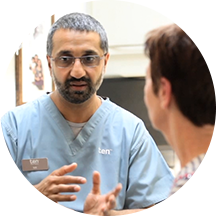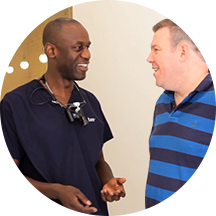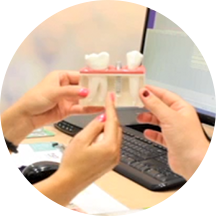Brand new treatment centre at 154 Clapham High Street, now open! Click here to find out more.

1. Read the relevant paperwork beforehand and do not hesitate to ask questions about any aspects of treatment that have not been made clear
2. Sign and return the appropriate paperwork
3. Attend for CT or other special investigations as requested
4. Ensure pre-medications and sedatives are taken as prescribed, if you are unsure contact your implant dentist to double check
5. Eat a good meal before the procedure as you will numb for several hours after
6. Do not plan any major social events for at least several days after surgery
7. Make sure you have Ibuprofen & Paracetamol tablets in stock for after the procedure (if you are allergic to either or should not take either please discuss appropriate pain relief measures with your implant dentist.)
8. Do not plan any activity that requires physical exertion for several days after surgery
9. Refrain from smoking at least 10 days before surgery (and 2 weeks after)
10. Alcohol consumption must be ceased for 1 week after surgery preferably 10 days
Before The Sedation Visit
You can have a light meal and non-alcoholic drinks up to 2 hours before the appointment
Do not consume alcoholic drinks for 24 hours before your sedation appointment.
Tell the dentist if you have been prescribed any new medicines or have visited a Doctor since your previous visit
Take any prescription medicines as normal; the dentist will have already checked that these are compatible with the sedative used.
Wear FLAT heeled shoes as you will be unsteady on your feet for a couple of hours following the Sedation visit.
You MUST bring a responsible adult with you to the sedation visit. They MUST remain here during your treatment and MUST escort you home. We will not be able to carry out the sedation treatment unless this person is actually present. It is a legal requirement that they remain in the practice during your treatment.
Do not wear any nail varnish or false nails as we need to place a pulse monitor that shines a light through your fingernail during the treatment.
After The Sedation Visit
DO NOT drive a vehicle for 24 hours.
DO NOT operate machinery, look after small children, or carry out any dangerous tasks, which require concentration, for 24 hours.
Do not consume alcohol or sleeping tablets for 24 hours following sedation as these may interact with the sedative that is still in your body.
Ensure you have a responsible adult with you for 24 hours.
Cancellation charges
As sedation appointments are long, cancellation charges apply. Any appointment cancelled within 48 hours will incur the full treatment fee. If cancelled within 1 week of the appointment, 50% of the treatment cost will be charged.


The success of your implants depends on your personal oral hygiene practices and regular visits to your hygenist and dentist. Professional cleaning should be done every three months.
It is extremely important for you to follow a daily programme of pral hygiene at home. While cleaning should be done as often as possible, the most important times are after breakfast in the morning and after your last meal in the evening. The following recommendations for cleaning around your implant abutments should be followed twice daily:
1. Use a soft nylon bristle toothbrush, such as Oral- B, Butler, Reach or Colgate plus. Before using the brush, rinse the bristles in hot water to soften them.
2. Brush with an anti-plazue white toothpaste.
3. Floss around each implant at least twice a day with regular dental floss, super floss, nylon yarn or with a long strip of cotton guze.
4. Rinse at least 15 seconds with an anti-plaque mouthwash.
5. If you have an irrigation system, use an anti-plaque mouthwash and irrigate around each implant abutment at a slow speed. This type of irrigation system is highly recommended to remove the plaque under your gums which harbour toxic bacteria. Rinsing out the toxins will lessen the chances for inflammation around the implant abutment.
6. If you have an electrical toothbrush, use it to clean the implant abutments, then apply Corsodyl, if instructed to do so.
7. It is advisable to occasionally check the inserts for bacterial film by using a plaque disclosing solution, or tablet. Chewing one tablet will turn your saliva red, which you should then wash around your mouth. After about one minute, discharge the saliva and rinse your mouth with water. The bacterial film will have absorbed the disclosing solution and changed its colour. Gently brush areas that are discoloured in order to remove bacteria.
8. Monitor yourself at home in order to detect early signs of inflammation, and contact your doctor if any problems arise.
These suggestions are intended to help you maintain healthy tissue and successful implants. It is your responsibility to practice good oral hygiene every day for the optimum health of your implants.
Have a look at the guide below from Curasept
© Copyright 2026 ten dental. all rights reserved|Website &Agency